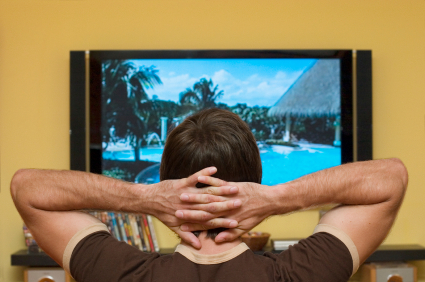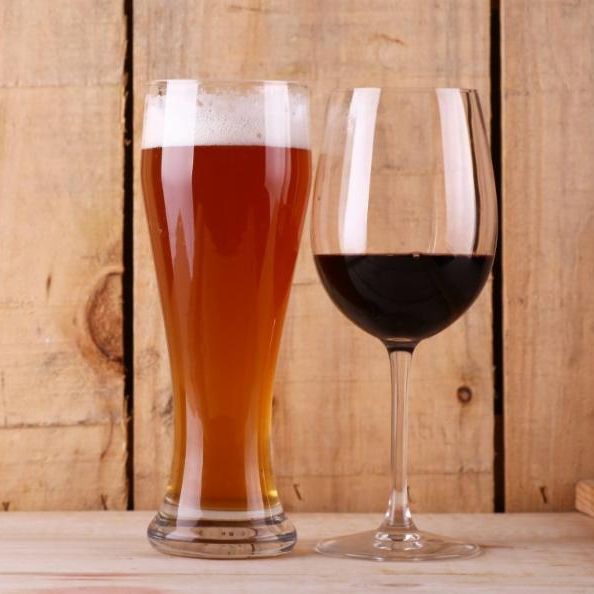|
|

|
|
I hope this newsletter finds you and your family well. Although the weather doesn't feel particularly spring-like, it's a great time to be a sports fan in Milwaukee. We had a memorable opening day yesterday (Not today!) and the Bucks are the #1 seed in the East. It's going to be a fun spring!
I remember people telling me as a child that TV would rot my brain. We are quite concerned about screen time and TV time in our children. But what about TV exposure as we age? Could this contribute to cognitive decline? Is Keeping Up With the Kardashians making us stupid? (16 seasons?!). The first study explores this and provides some insight.
We all should know that sugary drinks aren't good for us. But how dangerous are they? Can 1 Coke a day make my death more likely? The second study answers this question. If you drink even a soda daily, you'll want to check out this study. Diet Coke drinkers, you may want to read it as well...
Beer before wine, or is it wine before beer? Many of us have may have some rules we use when consuming alcohol. The third study sets out to answer the age old question, does drinking wine before beer give you a worse hangover than beer before wine? And no, tequila wasn't included.
Click on the links the the left to check out our
web site
.
|
|
TV Rots Your Brain
|
More television viewing associated with higher cognitive decline

We have long been concerned about the effects of television time in our children, but what about the effects of watching television as we age? Can watching TV contribute to cognitive decline? This study aimed to identify if moderate amounts of watching television in adults over age 50 is associated with decreased cognition 6 years later independent of other behaviors.
Abstract:
- There has been significant interest in the effects of television on cognition in children, but much less research has been carried out into the effects in older adults. This study aimed to explore whether television viewing behaviours in adults aged 50 or over are associated with a decline in cognition. Using data from the English Longitudinal Study of Aging involving 3,662 adults aged 50+, we used multivariate linear regression models to explore longitudinal associations between baseline television watching (2008/2009) and cognition 6 years later (2014/2015) while controlling for demographic factors, socio-economic status, depression, physical health, health behaviours and a range of other sedentary behaviours. Watching television for more than 3.5 hours per day is associated with a dose-response decline in verbal memory over the following six years, independent of confounding variables. These results are found in particular amongst those with better cognition at baseline and are robust to a range of sensitivity analyses exploring reverse causality, differential non-response and stability of television viewing. Watching television is not longitudinally associated with changes in semantic fluency. Overall our results provide preliminary data to suggest that television viewing for more than 3.5 hours per day is related to cognitive decline.
So does watching TV rot your brain? I know I feel less intelligent if I watch a reality TV show. But is this just subjective or is it actually objective? This study from England looked at 3662 adults over age 50 and followed them over 6 years. They found the subjects who watched more than 3.5 hours of television daily tended to have lower scores on cognitive testing, especially verbal memory 6 years later. So it appears that even moderate television viewing may have a negative effect on our brains. There are several theories on the mechanism of this. Watching television leads to a more alert but less focused brain which could lead to issues with memory and cognition. Perhaps watching TV for hours reduces our interaction with others and displaces other activities which could maintain or even build up our brains (puzzles, board games, reading, cultural activities). We don't know for sure. What we do know is that exercise is beneficial for our brains and cognition. Perhaps we should put down the remote and take a walk instead!
|
|
|
Link between intake of sugar-sweetened beverages and mortality
We all know that sugar-sweetened beverages (SSB) are not healthy (if this is news - we need to talk). They are associated with weight gain, diabetes, coronary heart disease and strokes. This large study was designed to examine if there is a link between SSB and mortality. They also examined artificially-sweetened beverages (ASB) like diet sodas to see if they had a link to increased mortality.
Abstract:
- BACKGROUND: Whether consumption of sugar-sweetened beverages (SSBs) or artificially sweetened beverages (ASBs) is associated with risk of mortality is of public health interest.
- METHODS: We examined associations between consumption of SSBs and ASBs with risk of total and cause-specific mortality among 37 716 men from the Health Professional's Follow-up study (from 1986 to 2014) and 80 647 women from the Nurses' Health study (from 1980 to 2014) who were free from chronic diseases at baseline. Cox proportional hazards regression was used to estimate hazard ratios and 95% confidence intervals.
- RESULTS: We documented 36 436 deaths (7896 cardiovascular disease [CVD] and 12 380 cancer deaths) during 3 415 564 personyears of follow-up. After adjusting for major diet and lifestyle factors, consumption of SSBs was associated with a higher risk of total mortality; pooled hazard ratios (95% confidence intervals) across categories (<1/ mo, 1-4/mo, 2-6/week, 1-<2/d, and ≥2/d) were 1.00 (reference), 1.01 (0.98, 1.04), 1.06 (1.03, 1.09), 1.14 (1.09, 1.19), and 1.21 (1.13, 1.28; P trend <0.0001). The association was observed for CVD mortality (hazard ratio comparing extreme categories was 1.31 [95% confidence interval, 1.15, 1.50], P trend <0.0001) and cancer mortality (1.16 [1.04, 1.29], P trend =0.0004). ASBs were associated with total and CVD mortality in the highest intake category only; pooled hazard ratios (95% confidence interval) across categories were 1.00 (reference), 0.96 (0.93, 0.99), 0.97 (0.95, 1.00), 0.98 (0.94, 1.03), and 1.04 (1.02, 1.12; P trend = 0.01) for total mortality and 1.00 (reference), 0.93 (0.87, 1.00), 0.95 (0.89, 1.00), 1.02 (0.94, 1.12), and 1.13 (1.02, 1.25; P trend = 0.02) for CVD mortality. In cohort-specific analysis, ASBs were associated with mortality in NHS (Nurses' Health Study) but not in HPFS (Health Professionals Followup Study) (P interaction, 0.01). ASBs were not associated with cancer mortality in either cohort.
- CONCLUSIONS: Consumption of SSBs was positively associated with mortality primarily through CVD mortality and showed a graded association with dose. The positive association between high intake levels of ASBs and total and CVD mortality observed among women requires further confirmation.
Do sugar sweetened beverages increase mortality? The answer is yes. This study demonstrated a 21% increase in overall mortality between those who had < 1 SSB/month and 2+ daily. A 31% increase in cardiovascular mortality was noted and cancer mortality increased 16% between these groups. Even 1-2 SSB daily resulted in a 14% increase in mortality.
Well, what about switching to Diet Coke? Artificially-sweetened beverages have been linked to metabolic dysfunction, strokes and dementia. In this study they were better than sugary drinks but still had increased risk with overall mortality increase of 4% between the lowest and highest groups and a 13% increase in cardiovascular mortality. Interestingly, only women showed increased mortality from the ASB (sorry ladies).
Bottom line, no one ever died of a Coke (or Diet Coke) deficiency, but that Coke may be making your death more likely. I'll stick with water.
|
|
The Science of the Hangover...
|
Beer before wine, or is it wine before beer? Does it matter?

Leave it to my German colleagues to attempt to answer to age old question: should one drink beer before wine to avoid a hangover (beer before wine, that's fine
)? This elegantly designed study was a
multiarm, parallel randomized controlled matched-triplet crossover open-label interventional trial which took 90 participants between the ages of 18 and 40 and assigned them to drink beer followed by wine, wine followed by beer, or stick with the drink they started with. The participants drank to a blood alcohol level of 0.11%. A week later they switched groups and did it again. The primary outcome measure was their score on the Acute Hangover Scale (yep, that exists) the next morning.
Abstract:
- Background: Alcohol-induced hangover constitutes a significant, yet understudied, global hazard and a large socio-economic burden. Old folk wisdoms such as "Beer before wine and you'll feel fine; wine before beer and you'll feel queer" exist in many languages. However, whether these concepts in fact reduce hangover severity is unclear.
- Objectives: The aim of this study was to investigate the influence of the combination and order of beer and wine consumption on hangover intensity.
- Methods: In this multiarm, parallel randomized controlled matched-triplet crossover open-label interventional trial, participants were matched into triplets and randomly assigned according to age, gender, body composition, alcohol drinking habits, and hangover frequency. Study group 1 consumed beer up to a breath alcohol concentration (BrAC) ≥0.05% and then wine to BrAC ≥0.11% (vice versa for study group 2). Control group subjects consumed either only beer or only wine. On a second intervention day (crossover) ≥1 wk later, study-group subjects were switched to the opposite drinking order. Control-group subjects who drank only beer on the first intervention received only wine on the second study day (and vice versa). Primary endpoint was hangover severity assessed by Acute Hangover Scale rating on the day following each intervention. Secondary endpoints were factors associated with hangover intensity.
- Results: Ninety participants aged 19-40 y (mean age 23.9), 50% female, were included (study group 1 n = 31, study group 2 n = 31, controls n = 28). Neither type nor order of consumed alcoholic beverages significantly affected hangover intensity (P > 0.05). Multivariate regression analyses revealed perceived drunkenness and vomiting as the strongest predictors for hangover intensity.
- Conclusions: Our findings dispel the traditional myths "Grape or grain but never the twain" and "Beer before wine and you'll feel fine; wine before beer and you'll feel queer" regarding moderate-to-severe alcohol intoxication, whereas subjective signs of progressive intoxication were confirmed as accurate predictors of hangover severity. This trial was prospectively registered at the Witten/Herdecke University Ethics Committee as 140/2016 and retrospectively registered at the German Clinical Trials Register as DRKS00015285.
Maybe this isn't a burning question in your mind, but I thought this was an interesting study. I was taught by my German teacher "beer before wine, that's fine, wine before beer stand clear". I must admit that I have followed this rule my entire adult life. After all, Germany has excellent beer and wine so I figured he ought to know. So have I been missing out? Could I have had a Spotted Cow after already downing a glass of Cabernet?
This study found that there was actually no difference whether one drank beer or wine first. Hangovers were equally bad. The severity of the hangover was based on feelings of drunkenness and vomiting then day of drinking. Hmm, well now at least we know. So this brings up the next scientific question; beer before liquor, never sicker?
|
|
Thank you for taking the time to read through this newsletter. I hope you have found this information useful as we work together to optimize your health. Feel free to pass this on to anyone you think would benefit from this information.
You can find previous newsletters archived on my website here.
As always, if you have questions about anything in this newsletter or have topics you would like me to address, please feel free to contact me by
email
, phone, or just stop by!
To Your Good Health,
Mark Niedfeldt, M.D.
|
|
|